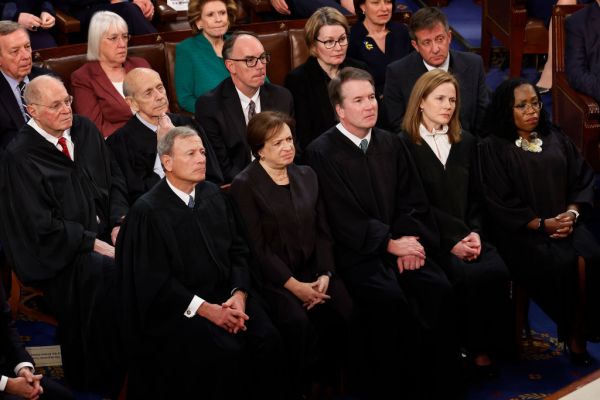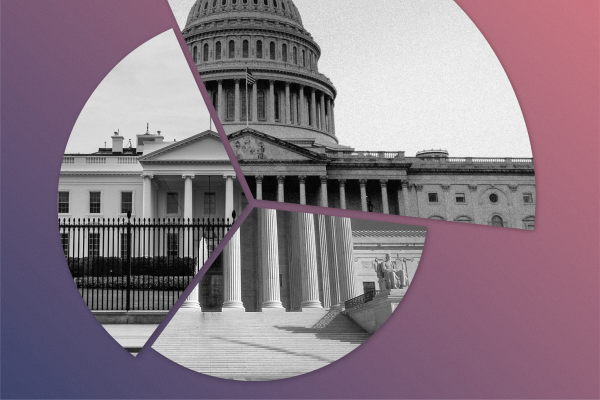For Supreme Court Justice Neil Gorsuch, American lawmaking is more dysfunctional than ever. In their new book Over Ruled: The Human Toll of Too Much Law, Gorsuch and his coauthor Janie Nitze recount story after story of ordinary Americans who have found themselves ensnared in regulatory nightmares, from a 62-year-old man hauled off to jail for unwittingly importing orchids without the proper paperwork, to a racecar driver convicted of a federal crime after accidentally veering into protected wilderness during a nearly fatal blizzard. They conclude there are too many laws that carry too high of penalties—and they’re being passed by unaccountable federal bureaucrats too removed from the people they regulate.
It’s hard to disagree with that assessment. As of 2018, federal statutes in the U.S. Code span 60,000 pages. The Federal Register, which contains federal regulations, makes up another 188,000 pages. Some estimate it would take more than three years to read the Federal Register, let alone understand it. And those figures don’t take into account the thousands of informal guidance documents that can also carry the force of law. When the Office of Management and Budget asked agencies to put their guidance documents online, the agencies reportedly refused simply because they didn’t know where to find all of them. They can’t even seem to agree on how many agencies exist.
In human terms, that means that if you want to run an orchard, you better get up to date with the 5,000-plus rules that apply at the federal level alone. If you’re a small-time magician who uses your pet rabbit in your show, don’t forget to satisfy the convoluted federal permitting scheme about carnivals, circuses, zoos, and one-man acts. Federal workers aren’t shy about going after violators, either. In the case of the snowmobiler who accidentally trespassed on protected land during a snowstorm, the government spent about $1 million over the course of several years just to collect a $75 fine.
If Justice Gorsuch’s goal is convincing readers that “law in our country has simply exploded,” he’s successful. But between the horror stories of excessive lawmaking, there’s a different story he misses—a story about judges who too often shy away when victims of overregulation seek refuge in the courts.
That story begins in the early 20th century, when the Supreme Court adopted a new, deferential standard of review for evaluating economic regulations. Judges had previously taken a serious look at all restrictions on people’s liberty to determine whether a challenged law infringed some constitutional right. But in the 1930s, the court created the “rational basis test.” Under this lax standard of scrutiny, judges will uphold a law so long as the legislature could’ve rationally concluded it was a good idea.
In practice, the standard has proved nearly toothless. Judges rotely defer to even patently absurd explanations for laws and to justifications contradicted by the evidence. They’re even permitted to conjure up their own rationales for laws if government attorneys can’t come up with anything themselves in court.
To be sure, not all rights get this poor treatment. Favored constitutional rights—free speech and religion, for example—are likely to summon a “strict scrutiny” standard from a judge, which is very difficult for the government to meet. But if you walk into court arguing that a law restricts a disfavored right, like your right to earn a living in the profession of your choice, you’re stuck in rational-basis land.
Add to this the Supreme Court’s reliance on avoidance doctrines, which allow it to kick cases out of court, and its practice of accepting fewer cases than ever, and it seems like judges aren’t doing enough judging. Like overzealous lawmaking, underzealous judging has terrible effects on real people: it recently resulted in a social worker being told she couldn’t start a care business for special needs kids simply because the government believed there were enough businesses already; it also meant that a company that could’ve aided early detection of colon cancer was kept out of the market by competitors.
Justice Gorsuch has written approvingly of what some call “judicial modesty.” He has frequently warned against judges replacing legislators’ policy decisions with their own personal preferences, especially in cases involving economic regulations. As a result, his book focuses on all the ways in which lawmaking violates the Constitution’s structural provisions, which ostensibly is more objective. For instance, he’s concerned with how much lawmaking happens at the federal level rather than in states or localities. He also laments how Congress has surrendered much of its lawmaking power to unaccountable executive agencies.
But in that supposed modesty, Gorsuch downplays how excessive lawmaking can also violate people’s rights. Structural provisions are just one aspect of the Constitution’s protections for individual liberty. Laws that follow the proper processes can still be unjust and unconstitutional in substance. And without judges to enforce those protections too, the Constitution is worth the parchment it’s written on.
What Over Ruled fails to consider is this: Would Americans be any better if we faced the same onerous regulations, albeit created by states? Would we be better off if the federal government’s regulatory minutia regarding ketchup, peanut butter, and vodka were transferred to localities? I think not. And when lawmakers pass laws that follow the required processes but are otherwise unconstitutional, it’s the judiciary’s duty to step in and strike those laws down.
The failure to appreciate the judiciary’s role in assessing whether laws are substantively unconstitutional plays out in Gorsuch’s description of Buck v. Bell, a 1927 case involving a woman who was forcibly sterilized after being deemed “feeble minded.” Carrie Buck appealed her case to the Supreme Court but lost on the basis that sterilizing her was a boon to the public. According to Justice Gorsuch, prior to the decision, the popularity of eugenics had been waning, but the court’s decision “buoyed” the movement.
What does he make of all this? In short, that it “stands as a reminder that taking up an issue on the national stage carries with it risks, especially when you seek to resolve it hastily and with certitude about the science of the day.”
But it’s worth considering whether Buck proves just the opposite: that the court plays a vital role in defending liberties, and sometimes (though, not always) there is in fact one right answer. In Buck’s case, the answer is that you can’t take people’s rights away based on vague allegations about the “public good.” The lesson is that the Supreme Court failed and should do better, not that it shouldn’t adjudicate constitutional disputes at all.
Gorsuch rightly argues that judges shouldn’t replace policy decisions with their own preferences. But deciding whether something violates a person’s constitutional right is not a policy dispute. It involves asking whether a law is directed toward a truly legitimate purpose or instead is pure favoritism. It requires examining whether a law actually accomplishes its purported end or is instead an arbitrary or irrational exercise of power. And it demands that courts not only point their fingers at overzealous bureaucrats, but also at the judges in the mirror. Each branch has a job to do in our constitutional order.






Please note that we at The Dispatch hold ourselves, our work, and our commenters to a higher standard than other places on the internet. We welcome comments that foster genuine debate or discussion—including comments critical of us or our work—but responses that include ad hominem attacks on fellow Dispatch members or are intended to stoke fear and anger may be moderated.
With your membership, you only have the ability to comment on The Morning Dispatch articles. Consider upgrading to join the conversation everywhere.